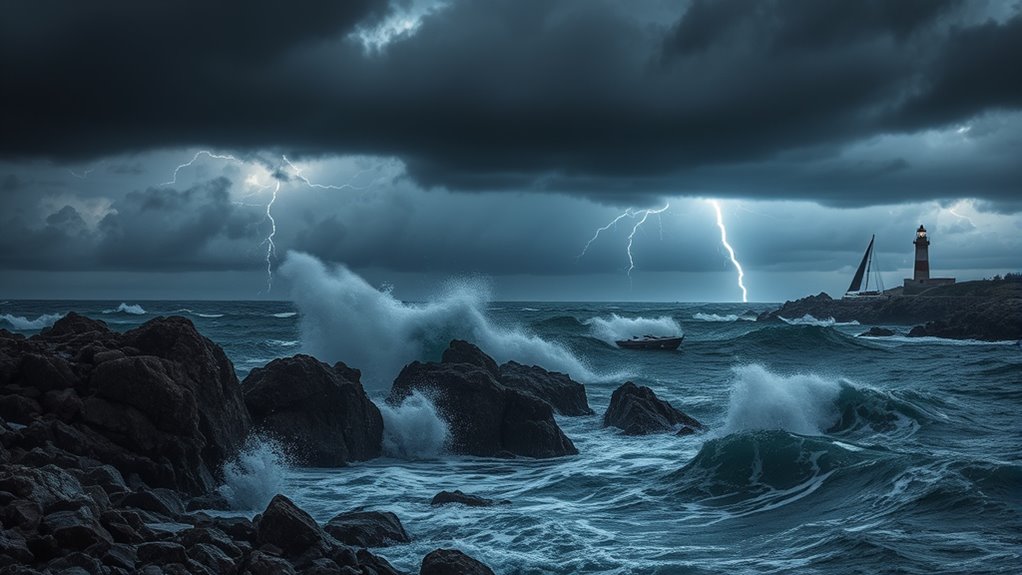Force‑majeure clauses protect your tour contracts from unexpected events beyond your control, like natural disasters, political upheaval, or emergencies. These clauses clarify when and how you can suspend or modify obligations without penalty, helping you manage disruptions smoothly. By including clear definitions, notification procedures, and specific triggers, you guarantee better risk management. Understanding how to craft and apply these provisions empowers you to handle unforeseen circumstances effectively—continue exploring to learn how to optimize your tour agreements.
Key Takeaways
- Clearly define qualifying events like natural disasters or political unrest to ensure proper invocation during unforeseen incidents.
- Specify notification procedures and timelines to ensure timely communication and documentation during force majeure events.
- Include provisions for delays, suspensions, or cancellations without penalties, safeguarding the tour’s flexibility.
- Align scope with industry standards to prevent disputes over what constitutes a force majeure event.
- Address potential contract modifications or extensions resulting from disruptions, enhancing planning resilience.
Understanding the Purpose of Force‑Majeure Clauses

Have you ever wondered why force-majeure clauses are included in contracts? These clauses are designed to protect you when unforeseen events make it impossible or extremely difficult to fulfill your contractual obligations. They acknowledge that sometimes, circumstances beyond your control—like natural disasters, wars, or pandemics—disrupt normal operations. Including a force-majeure clause provides clarity on how to handle such disruptions, often allowing for delays, suspensions, or cancellations without penalties. The main goal is to allocate risk fairly between parties and prevent legal disputes during unpredictable times. Without this clause, you might be held liable for failures caused by events outside your influence. A well-drafted clause also considers the specific types of events that qualify as force majeure, such as natural disasters, which are particularly relevant in the context of unpredictable disruptions. Additionally, understanding the scope of contractual obligations affected by such events helps parties prepare appropriately. Recognizing the impact of unexpected disruptions on operations is crucial for effective risk management. Overall, force-majeure clauses serve as a safety net, ensuring you’re protected when the unexpected occurs, especially in situations involving unpredictable disruptions.
Common Triggers and Events Covered by Force‑Majeure

Natural disasters like earthquakes, floods, and hurricanes often trigger force-majeure claims, disrupting supply chains and operations. Political unrest, protests, or government actions can also qualify as events beyond your control that excuse performance delays. Recognizing these common triggers helps you understand when force-majeure clauses might apply to protect your interests.
Natural Disasters Impact
Force-majeure clauses typically cover a range of natural disasters that can disrupt contractual obligations. These events include hurricanes, earthquakes, floods, wildfires, and tornadoes, all of which can cause significant delays or cancellations. When such disasters occur, they can make it impossible or impractical for you to fulfill your contractual duties. For example, severe storms might damage infrastructure, preventing transportation or access to key locations. Earthquakes could destroy facilities or disrupt supply chains. Floods and wildfires may force evacuations or halt operations. Because these events are unpredictable and beyond your control, force-majeure clauses help protect you from liability by temporarily suspending your obligations until conditions improve. Additionally, understanding the variety of materials and how they respond to environmental factors can help in planning for potential disruptions. Recognizing the impact of environmental events on infrastructure can aid in developing more resilient tour operations. Knowing how climate change influences the frequency and severity of natural disasters can further enhance preparedness and risk management strategies. Understanding these triggers ensures that you’re prepared and know how to invoke the clause if a natural disaster impacts your tour Modern Farmhouse.
Political Unrest Disruptions
Political unrest can considerably disrupt your plans, and force-majeure clauses often cover events like protests, riots, civil disturbances, or government actions that impede your ability to perform contractual duties. These disruptions can halt operations, close borders, or restrict movement, making it impossible to fulfill commitments. If a government declares a state of emergency or enforces martial law, it’s typically included as a force-majeure event. Such unrest can create unsafe conditions, delay transportation, or block access to venues and resources. When these situations occur unexpectedly, your force-majeure clause may allow you to suspend or cancel obligations without penalties. Understanding how political unrest is covered helps you protect your business interests and navigate disruptions more effectively during turbulent times. Incorporating industrial and Victorian-inspired design elements into your planning can sometimes provide creative solutions or aesthetic resilience during disruptions. For instance, integrating robust and adaptable design features can help mitigate the impact of unforeseen events. Additionally, leveraging automation technology can enhance operational continuity during political unrest, ensuring minimal disruption to your services. Moreover, fostering cultural intelligence within your crisis management team can improve decision-making and stakeholder communication during such unpredictable situations. Understanding how political unrest is covered helps you protect your business interests and navigate disruptions more effectively during turbulent times.
Key Elements to Include in a Force‑Majeure Clause

To create an effective force-majeure clause, you need to clearly define what events qualify as force majeure. You should also specify the scope of excusable nonperformance and outline procedures for notification and documentation. These key elements guarantee both parties understand their rights and responsibilities during unexpected disruptions. Incorporating provisions for market volatility can further strengthen the clause by addressing economic uncertainties beyond control. Additionally, referencing vetted standards for safety and reliability can help ensure the clause aligns with recognized best practices in the industry. Recognizing the importance of personality traits in decision-making can also aid in tailoring the clause to specific organizational cultures and risk tolerances.
Clear Event Definitions
Have you clearly defined what qualifies as a force majeure event in your contract? Precise definitions prevent misunderstandings and disputes. Specify which events qualify, such as natural disasters, war, terrorism, or government actions. Avoid vague language like “acts of God” without elaboration. Consider including specific examples relevant to your industry or location. Clarify whether events must be unforeseen, beyond control, or unavoidable to qualify. This reduces ambiguity and helps both parties understand when the clause applies. Make sure your definitions are consistent throughout the contract, and consider including a list or detailed description. Clear event definitions protect you from claims of unexpected or exaggerated excuses, ensuring that both parties have a shared understanding of what triggers the force majeure clause. Additionally, understanding the role of attention in creative practice can inform how parties monitor and respond to evolving circumstances, enhancing the effectiveness of the clause. Incorporating industry-specific scenarios can further tailor the clause to address unique risks in your field. Being aware of contractual clarity is essential in drafting effective force majeure provisions and avoiding future legal complications.
Excusable Nonperformance Scope
What exactly is covered under the scope of excusable nonperformance in a force-majeure clause? Typically, it includes events beyond your control that prevent you from fulfilling your contractual obligations. These events can be natural disasters like earthquakes, hurricanes, or floods, as well as human-made disruptions such as wars, strikes, or government actions. It’s essential that the clause clearly specifies which types of events qualify, so there’s no ambiguity during a crisis. The scope also covers delays caused by these events, not just complete nonperformance. However, it generally excludes issues that could have been avoided with reasonable care or foreseeability. By defining this scope precisely, you protect yourself from liability when unforeseen circumstances genuinely hinder your ability to perform.
Notification and Documentation
How can you guarantee that a force-majeure event is properly recognized and handled? Clear notification and thorough documentation are essential. Your contract should specify how soon you must notify the other party after an event occurs—timely communication prevents disputes. Make sure to outline the preferred method of notification, whether in writing or via email. Keep detailed records of the event, including dates, circumstances, and any impact on performance. Documentation like photos, news reports, or official statements can support your claim. By establishing these requirements upfront, you ensure the other party understands their responsibilities and that you have solid proof if a dispute arises. Proper notification and documentation protect your interests and facilitate efficient resolution during unforeseen events.
How to Draft Effective and Clear Force‑Majeure Provisions

Drafting effective and clear force-majeure provisions requires careful attention to language that precisely defines what events qualify as unavoidable or beyond control. Use specific, unambiguous terms to describe events like natural disasters, government actions, or health emergencies. Avoid vague phrases that can lead to disputes. Consider including a list of events explicitly covered to set clear expectations. Make sure the clause specifies how and when either party must notify the other about force majeure events. Additionally, outline the procedures for suspension or termination of obligations during such events. Clear language minimizes misunderstandings and provides legal certainty.
- Use precise, specific language to define covered events
- Include explicit notification and response procedures
- Clarify the scope of rights and obligations during force majeure
Impacts of Force‑Majeure on Tour Contracts and Agreements

Force majeure clauses can substantially impact tour contracts and agreements by defining the circumstances under which performances may be delayed, modified, or canceled without liability. When a force majeure event occurs, it can trigger a suspension of obligations, giving you flexibility to adapt without facing penalties. These clauses often specify which events qualify, such as natural disasters or government actions, directly affecting your ability to fulfill contractual commitments. They may also establish procedures for notifying the other party and negotiating adjustments. As a result, your planning becomes more resilient, allowing you to mitigate losses or reschedule engagements. However, unclear or overly broad clauses can lead to disputes, so understanding their scope and implications is vital for protecting your interests during unforeseen disruptions.

During a force-majeure event, timely and proper notices are crucial to protect your rights and obligations under the contract. You should notify the other party as soon as possible, following the notice procedures specified in your agreement. Clear documentation of the event helps establish your position and demonstrates your good faith efforts. Keep records of all communications, including emails, letters, and phone calls, to create a solid paper trail. This documentation can be essential if disputes arise or if you need to invoke the force-majeure clause.
- Ensure your notice includes specific details about the event and its anticipated impact
- Send notices via certified mail or another trackable method
- Maintain copies of all correspondence related to the event
Strategies for Managing Risks and Resolutions When an Event Occurs

When a force-majeure event occurs, proactively managing risks and seeking resolution can minimize disruptions and protect your interests. Start by evaluating the situation quickly, identifying the key issues, and communicating openly with stakeholders. Consider options like renegotiating terms, postponing deadlines, or exploring alternative solutions. To visualize your approach, think of this table:
| Identify Risks | Develop Action Plans | Communicate Clearly |
|---|---|---|
| Recognize immediate threats | Outline steps to mitigate impact | Keep all parties informed |
| Prioritize critical issues | Adjust schedules or contracts | Maintain transparency |
| Prepare for possible outcomes | Seek legal or expert advice | Document every decision |
These strategies help you stay in control, find solutions efficiently, and limit damage when the unexpected happens.
Best Practices for Reviewing and Updating Force‑Majeure Clauses

Are your force-majeure clauses up to date and effective in covering current risks? Regularly reviewing and updating these clauses ensures they remain relevant and enforceable. Start by analyzing recent events and emerging risks to identify gaps or outdated language. Consult legal experts to interpret new laws or regulations affecting force majeure. Make sure your clauses clearly define what qualifies as an event and specify procedures for notification and mitigation. Keep the language precise to avoid ambiguity, and consider including specific examples relevant to your industry. Additionally, document changes thoroughly and communicate updates to all stakeholders. Regular reviews help you adapt to evolving circumstances, minimizing legal disputes and protecting your interests during unforeseen events.
Regularly update force-majeure clauses to stay protected against evolving risks and legal requirements.
- Conduct periodic risk assessments.
- Incorporate recent legal developments.
- Communicate updates clearly to all parties.
Frequently Asked Questions
Can Force‑Majeure Clauses Be Negotiated After Contract Signing?
You might wonder if you can negotiate force-majeure clauses after signing a contract. While it’s possible, it’s usually more challenging because both parties have already agreed on terms. However, if circumstances change considerably or new risks emerge, you can approach the other party and propose amendments. Keep in mind, success depends on mutual agreement, and some contracts may have provisions limiting post-signing modifications.
How Do Force‑Majeure Clauses Apply Internationally?
Imagine a world where nature’s fury or political upheaval can suddenly halt your plans—that’s where force-majeure clauses come in. Internationally, they vary widely; some countries favor broad protections, others impose strict limits. You need to comprehend local laws and treaty obligations because these clauses are interpreted differently across borders. So, always review and tailor your contracts to guarantee you’re shielded no matter where your tour takes place.
Are There Limitations to Invoking Force‑Majeure?
When you consider invoking a force-majeure clause, be aware that there are limitations. You must prove the event truly was beyond your control, unavoidable, and not caused by negligence. Some clauses specify certain events or timeframes, and courts may scrutinize whether you took reasonable steps to prevent or mitigate the impact. So, while these clauses offer protection, they aren’t unlimited shields; you need to meet specific criteria.
What Are Examples of Events Typically Excluded From Coverage?
You might wonder which events aren’t covered by force-majeure clauses. Typically, these exclusions include events like financial hardships, strikes, or government restrictions that aren’t considered truly beyond your control. Personal negligence or foreseeable issues usually aren’t covered either. It is crucial to review your specific clause, as exclusions can vary. Knowing these limitations helps you understand when you can’t claim force majeure and prepares you for potential risks.
How Do Force‑Majeure Clauses Interact With Insurance Policies?
You need to understand that force-majeure clauses often specify events that can excuse performance, but they don’t replace insurance coverage. When an event triggers a force-majeure clause, it can limit your liability or obligations, but insurance policies provide financial protection for specific risks. These two work together: the clause offers legal relief, while insurance covers damages or losses. Make certain your contracts and policies align to ensure thorough protection.
Conclusion
By understanding and carefully crafting your force‑majeure clauses, you can shield your tours from the storm clouds of the unexpected. Think of these provisions as your safety net—ready to catch you when unforeseen events threaten to derail your plans. Stay proactive, keep your documentation in check, and review your contracts regularly. Doing so guarantees you’re better prepared to navigate rough waters and keep your journey on course, no matter what surprises lie ahead.









